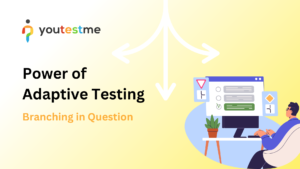Table of Contents
🗓 Jun 21, 2024. 🕒 10 min read
Power of Adaptive Testing:
Question Branching
Computer adaptive testing is an innovative approach where the difficulty, level, and sequence of questions adjust according to your performance during the test. This differs from static testing, where the questions are fixed and unchanging throughout the exam. To enhance this adaptive approach, YouTestMe has developed a Questions Branching feature, enabling dynamic question paths based on a candidate’s previous answers.
This blog will show you how you can enhance your question pools with branching logic, making your assessments more engaging and reflective of individual abilities.
What is Question Branching?
Branching in questions in online assessments, also known as adaptive testing or dynamic questioning, refers to the technique of tailoring the sequence of questions based on the respondent’s previous answers. This approach enhances the assessment process by creating a more personalized and efficient experience.
How It Works?
- Initial Question –The assessment starts with a general or baseline question.
- Response Analysis – Based on the respondent’s answer, the system determines the next question.
- Adaptive Pathway – The subsequent questions vary in difficulty or content, adapting to the respondent’s performance and knowledge level.
- Feedback Loop – Each answer informs the next step, creating a customized assessment path for each user.
Benefit of Adaptive Testing
Branching in online assessment platform like YouTestMe, offers several key benefits that enhance the testing experience for both administrators and candidates. Here are the primary advantages:
The insights gained from adaptive assessments can inform curriculum development and training programs, leading to continuous improvement in learning outcome. Adaptive assessments can be designed to accommodate a wide range of abilities and learning styles, making them more inclusive.
If you would like to see how adaptive testing works and try out the YouTestMe Branching in Question feature, request your
free trial today.










